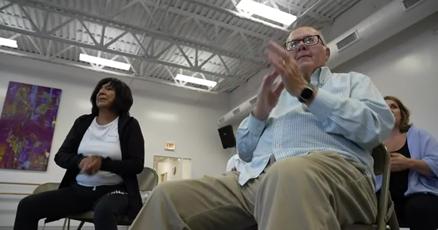
A trial of a new £2.5-million personalised care and self-management programme aimed at improving quality of life for people with Parkinson’s and others with long-term conditions began in the UK in September.
Called Co-Action, the new four-year programme is the result of the findings that came out of the OPTIM-PARK European research trial funded by the Joint Programme for Neurodegenerative Diseases. Designed to bring about a multi-sector intervention to support people with Parkinson’s and carers in their daily lives, the project produced five scientific articles* after consulting people with Parkinson’s, family carers, representatives from voluntary organisations and healthcare professionals in Denmark, Norway, Spain and the UK between 2020 and 2022. Four of the studies were published over the past two years, while the final one, about a proposed care pathway to support personalised care for people with Parkinson’s and their families, will be published next year.
Professor Mari Carmen Portillo, Professor of Long Term Conditions at the UK’s University of Southampton, and leader of the OPTIM-PARK project, spoke about its aims: “Based on our previous experience of doing research with people with other long-term conditions and people with Parkinson’s, we found out that there are many similarities across conditions, that the systems of support vary from country to country, and that there’s a huge gap when it comes to working with carers in this field. So, we thought that it was a good idea to try to propose an intervention that could bring together the different systems of support, and to check how it could be rolled out in different countries.”
Co-Action for personalised care
The Co-Action programme will focus on providing systematic personalised care, which was one of the most important findings to come out of one of the five OPTIM-PARK articles, “Perspectives of people with Parkinson’s disease and family carers about disease management in community settings”. It established that throughout the course of Parkinson’s, as well as a medical treatment plan, people need access to emotional support, physical rehabilitation, and information on health services, voluntary associations and community groups.
Prof. Portillo explains more: “One of the problems with the existing clinical guidelines – not only for Parkinson’s, but for all long-term conditions – is that they focus very much on the biomedical aspects of the conditions, on the diagnosis and the journey related to medical treatment and consultation. When we talk about personalised care, we need a game-changing shift from a treatment or biomedical approach towards a person-centred approach, in which we focus on what really matters to people on a daily basis. And this may not be connected to the condition per se. It may be acceptance [of the condition], or a need to know which resources or systems of support are available. We are talking about fatigue, social life, social support and loneliness. One of the ideas that came out was that health and social care would work more closely together by involving voluntary Parkinson’s associations to achieve personalised care and improve the Parkinson’s journey.”

One of the aims of Co-Action is, therefore, to implement a care pathway that will set out how voluntary organisations could play a bigger and more structured role, working alongside health and social care services to provide consistent and meaningful care.
Prof. Portillo says: “We have done plenty of research in which we have seen that even for other conditions, voluntary organisations can cover a lot of needs when it comes to the management of the condition alongside formal services.”
Care coordinators vital
Another of the published OPTIM-PARK articles, “A Parkinson care coordinator may make a difference”, found that a care coordinator would be vital if such a collaborative approach was to work. This person would assess the needs of the person with Parkinson’s and involve them and their family carers in deciding which systems of support in the community would be best for them.
The coordinator would then synchronise the work of the different voluntary organisations with that of healthcare providers according to the person’s needs and follow up to see if and how these support systems were helping them.
An app is also currently in development that people with Parkinson’s or other long- term conditions – such as arthritis – will be able to use in order to access resources to improve their quality of life. The app is being supported by the Applied Research Collaboration programme Wessex at the University of Southampton to test its applicability in primary care services.
One service for all conditions
The published articles also highlighted that those living with long-term conditions like Parkinson’s share common problems, which should be the focus of care pathways rather than individual diagnoses.
The new Co-Action programme will, therefore, see people with different conditions accessing similar services. For example, a person with Parkinson’s could join support groups to improve mobility alongside someone with arthritis who could also have mobility needs.
Co-Action is taking place across three different sites in the UK, and Prof. Portillo says that the participation of those with two or more long-term conditions will be essential: “We want to include them to help us shape our intervention further so that it’s even more meaningful for them; this is very much about engaging them and co-producing with them.”
Prof. Portillo is working with colleagues in Spain to propose and test a similar study working with people with multiple long-term conditions including Parkinson’s there.
*The four OPTIM-PARK studies already published are:



